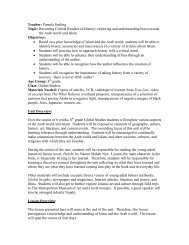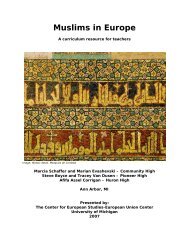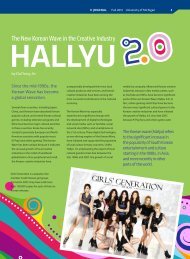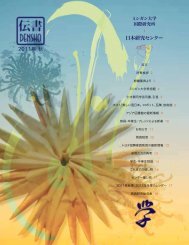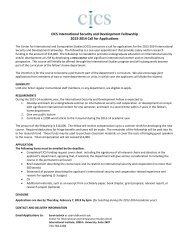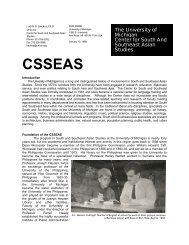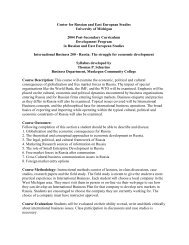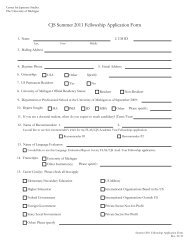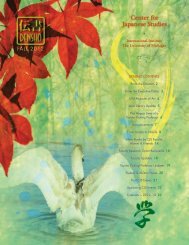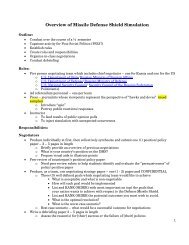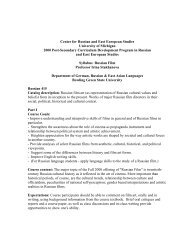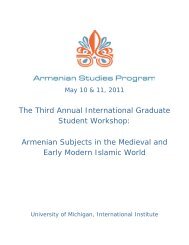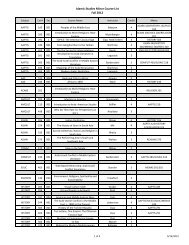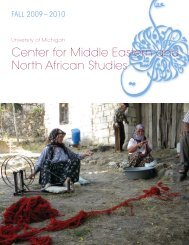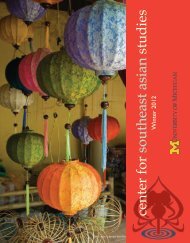Winter 2008 Newsletter - International Institute - University of Michigan
Winter 2008 Newsletter - International Institute - University of Michigan
Winter 2008 Newsletter - International Institute - University of Michigan
You also want an ePaper? Increase the reach of your titles
YUMPU automatically turns print PDFs into web optimized ePapers that Google loves.
Southeast Asian Language, Linguistics and Literature at <strong>Michigan</strong><br />
3<br />
As the Center for Southeast Asian Studies approaches the upcoming<br />
50th anniversary <strong>of</strong> our founding in 1961, we hope to<br />
take the time in our newsletters to reflect back. When alumni<br />
more than ten years out <strong>of</strong> Ann Arbor return to find us in our<br />
new suite <strong>of</strong> <strong>of</strong>fices in the very modern <strong>International</strong> <strong>Institute</strong>,<br />
many invariably become nostalgic about the “good old days in<br />
Lane Hall,” where faculty and students packed into the crowded<br />
basement room for Friday lectures and visitors seeing people<br />
sitting on the tatami in the front lobby could be rightfully excused<br />
for being surprised that the language they heard being<br />
spoken was not Japanese, but rather Indonesian or Thai.<br />
Language is at the core <strong>of</strong> all area<br />
studies, and with language acquisition,<br />
there is always a need for<br />
good teaching. Nostalgia for Lane<br />
Hall aside, when CSEAS alumni<br />
speak <strong>of</strong> their experiences here,<br />
much <strong>of</strong> what they talk about is<br />
their strong relationships with their<br />
teachers and mentors. Southeast<br />
Asian Studies at <strong>Michigan</strong> has been<br />
very fortunate to have been an<br />
early source <strong>of</strong> instruction on the<br />
major Southeast Asian languages,<br />
provided by a committed and<br />
talented faculty who has inspired<br />
generations <strong>of</strong> students. Bill Gedney<br />
started the teaching <strong>of</strong> Thai in<br />
1960, while Netherlands Visiting<br />
Pr<strong>of</strong>essor Hans Teeuw inaugurated<br />
Indonesian in 1963, and was followed<br />
by Alan Stevens, and then<br />
Alton (Pete) Becker. Becker’s first<br />
Ph.D. student, Paz Buenaventura<br />
Naylor, inaugurated the teaching<br />
<strong>of</strong> Tagalog (Filipino) in 1977, and<br />
Vietnamese was introduced in 1992<br />
by Nguyen Thi Nga.<br />
Beyond the teaching <strong>of</strong> languages,<br />
the <strong>Michigan</strong> scholars we pr<strong>of</strong>ile<br />
Clockwise t: Paz Naylor, Bill Gedney, Rob Burling,<br />
Pete Becker<br />
on the following pages —Pete Becker, Rob Burling, Bill Gedney<br />
and Paz Naylor — conducted pioneering research, including<br />
intensive fieldwork, on Southeast Asian languages, linguistics<br />
and literature, and related historical, cultural and social subjects.<br />
Their many dedicated Ph.D. students have continued this<br />
work and disseminated it, not only through their own individual<br />
teaching and research, but also through their academic<br />
entrepreneurship at other institutions.<br />
John Hartmann and Patricia Henry have contributed much to<br />
the development <strong>of</strong> Northern Illinois <strong>University</strong>’s Center for<br />
Southeast Asian Studies as a major location for publications<br />
on Southeast Asian linguistics. Together with colleagues in<br />
computer science and languages, and growing from a pioneering<br />
computer-aided instruction project at U-M, headed by Rob<br />
Burling and Pete Becker, they have developed SEAsite, an online<br />
resource for seven major Southeast Asian languages and<br />
cultures, www.seasite.niu.edu , funded by the U.S. Department<br />
<strong>of</strong> Education. Tom Hudak and Karen Adams also developed<br />
a linguistics publications series at Arizona State <strong>University</strong>’s Program<br />
in Southeast Asian Studies.<br />
Tom Gething was instrumental in establishing the Southeast<br />
Asian Studies Summer <strong>Institute</strong> (SEASSI), a summer-intensive<br />
language consortium inaugurated at <strong>Michigan</strong> in 1983, which<br />
rotated through several other universities and is now at the<br />
<strong>University</strong> <strong>of</strong> Wisconsin-Madison, where Bob Bickner serves<br />
as its Language Director. Bob and Patcharin Peyasantiwong<br />
started the Consortium for the Advanced Study <strong>of</strong> Thai (CAST)<br />
which runs in-country summer language training at Chiang Mai<br />
<strong>University</strong>. Tom Gething later took over administration <strong>of</strong> CAST,<br />
now headquartered at the <strong>University</strong> <strong>of</strong> Washington-Seattle,<br />
while Bob and Patcharin established the <strong>University</strong> <strong>of</strong> Wisconsin’s<br />
College Year in Thailand program, now in its 25th year.<br />
<strong>Michigan</strong> has long been an interdisciplinary<br />
place, so it is not unusual<br />
perhaps that even as linguistics and<br />
the study <strong>of</strong> languages and the<br />
histories and cultures that surround<br />
them increasingly diverge, scholars<br />
at <strong>Michigan</strong> have <strong>of</strong>ten been interested<br />
in both, reflecting long-time<br />
hybrid interests <strong>of</strong> their teachers. This<br />
interest continues with our current<br />
students. Linguistics doctoral student<br />
Eric Brown is interested in questions<br />
<strong>of</strong> language contact and change, particularly<br />
in Tai-Kadai languages and<br />
in studying language attrition among<br />
Lao immigrants and their children in<br />
California, while Anthropology doctoral<br />
student Hillary Brass is interested<br />
in language shift markers and the<br />
colloquial use <strong>of</strong> English as it is intersluiced<br />
with modern Indonesian.<br />
Quite a few recent CSEAS Masters<br />
theses have focused on language and<br />
literature. Rebekah Linh Collins wrote<br />
about the “Viet Nam/American War in<br />
Vietnamese Poetry” in 2003, Shawn<br />
Callanan’s 2006 exploration <strong>of</strong> the<br />
language <strong>of</strong> Indonesian nationalism in<br />
the writings <strong>of</strong> Mas Marco is entitled<br />
“Mata Gelap, Crossing Language,” and Jack Merchant explored<br />
the historical context <strong>of</strong> Nguyen Du’s Tale <strong>of</strong> Kieu in 2007. All<br />
three have continued on to doctoral programs, where their<br />
research continues.<br />
With this <strong>Newsletter</strong> Focus, we are pleased and proud to<br />
celebrate the achievements, both in and outside <strong>of</strong> academia,<br />
<strong>of</strong> our past faculty and alumni in Southeast Asian languages,<br />
linguistics and literature. We begin with pr<strong>of</strong>iles <strong>of</strong> four former<br />
faculty – Becker, Burling, Gedney, and Naylor – and continue<br />
with brief and surely incomplete listings <strong>of</strong> their doctoral students,<br />
<strong>of</strong> where they have gone on to work, and <strong>of</strong> some <strong>of</strong> the<br />
research they have published. Taken together, this corpus forms<br />
the bedrock <strong>of</strong> <strong>Michigan</strong>’s enduring contribution to the field <strong>of</strong><br />
Southeast Asian Studies in the United States, to which the dedication<br />
<strong>of</strong> these individuals has been, and remains, exemplary.<br />
Help on our former faculty bios was gratefully received from Karen<br />
Adams (for Pete Becker), Mary Bresnahan (for Paz Naylor), John<br />
Hartmann and Tom Hudak (for Bill Gedney), and Patricia Henry<br />
(for Rob Burling).<br />
continued on page 4



